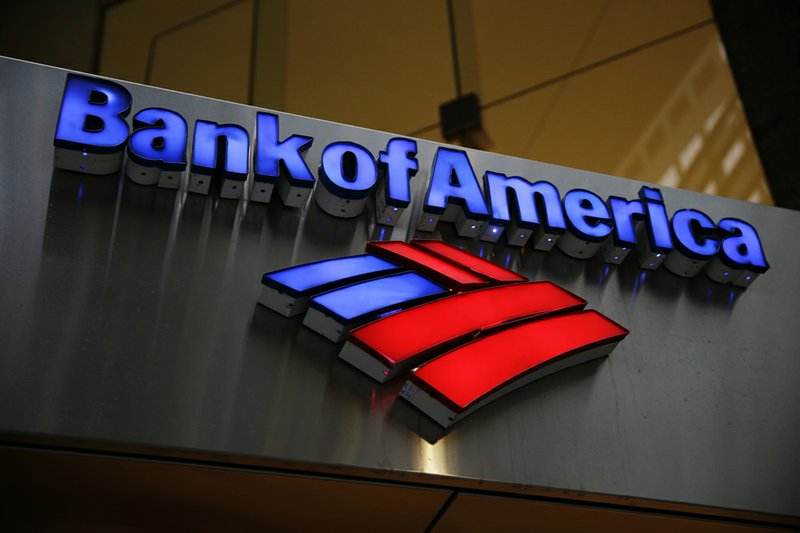WASHINGTON -- Bank of America has reached a record $17 billion settlement to resolve an investigation into its role in the sale of mortgage-backed securities before the 2008 financial crisis, officials directly familiar with the matter said Wednesday.
One of the officials, who spoke with The Associated Press on condition of anonymity because the announcement isn't scheduled until today at the earliest, said the bank will pay $10 billion in cash and provide consumer relief valued at $7 billion. Bloomberg News reported the cash payment will be $9 billion.
The accord will cement Bank of America's status as the firm most harshly punished for its faulty mortgage practices and practices of subprime lenders Countrywide Financial Corp. and Merrill Lynch, purchased by Bank of America in 2008.
The deal is the largest settlement arising from the economic meltdown in which millions of Americans lost their homes to foreclosure. It follows agreements in the past year with Citigroup for $7 billion and with JPMorgan Chase & Co. for $13 billion.
Like the Bank of America deal, those settlements were a mixture of hard cash and "credits" for various forms of consumer aid that the banks promised to provide in coming years.
The Bank of America settlement was negotiated through a joint federal and state working group established by President Barack Obama two years ago with the Justice Department and other federal and state authorities. Individual states are expected to share in the settlement.
Justice Department spokesman Ellen Canale declined to comment, as did New York Attorney General Eric Schneiderman, a co-chairman of the group. The bank also declined comment.
Bank of America's settlement with the Justice Department comes on top of its $9.5 billion deal in March to resolve related Federal Housing Finance Agency claims.
The deal requires Bank of America to acknowledge making serious misrepresentations about the quality of its residential mortgage-backed securities issued by itself and by Countrywide Financial and Merrill Lynch. Those institutions were acquired by the bank when they were on the brink of failure in 2008, and they were responsible for the bulk of the questionable loans.
The deals are intended to offer some financial relief to homeowners, whose mortgages were bundled into securities by the banks in question and then sold to investors.
The securities contained residential mortgages from borrowers who were unlikely to repay their loans. Still, the securities were promoted as relatively safe investments until the housing market collapsed and investors suffered billions of dollars in losses.
The poor quality of the loans led to huge losses for investors and a slew of foreclosures, kicking off the recession that began in late 2007. The cash totals now being paid by some of the country's largest banks are not nearly enough to reverse the damage caused by the bursting of the housing bubble and the ensuing recession.
Bank of America had argued that it shouldn't be held liable for the subprime mortgages issued by Countrywide and Merrill Lynch. Combined, those three firms issued $965 billion in mortgage-backed securities from 2004 to 2008, according to public records. Roughly 75 percent of that total came from Countrywide.
In a federal lawsuit last year, the Securities and Exchange Commission charged Bank of America and two subsidiaries with defrauding investors in an offering of residential mortgage-backed securities by failing to disclose key risks and misrepresenting facts about the underlying mortgages.
The Justice Department filed a parallel civil action against Bank of America alleging violations of the Financial Institutions Reform, Recovery, and Enforcement Act.
Federal prosecutors in California are preparing a lawsuit against Countrywide co-founder Angelo Mozilo and as many as 10 other former Countrywide employees, according to two people with knowledge of the matter. The suit could be filed in Los Angeles in the coming months, the people said.
Bank of America is expected to be able to write off a portion of the settlement as a tax-deductible business expense. When their settlements were announced, JPMorgan and Citigroup also said portions were tax-deductible.
A source close to the negotiations told The Charlotte Observer last week that roughly $9 billion of the Bank of America settlement is expected to be in two forms: a penalty payment to the U.S. government, and separate cash payments to federal agencies and various states.
While the penalty payment would not be tax-deductible under U.S. tax law, any cash payments would be.
The deal has sparked criticism from consumer-advocacy groups, who say it's unfair to taxpayers that a portion of the settlement will likely be tax deductible.
"To understand how significant the BofA settlement really is, people need to ask how many billions the bank is allowed to write off as tax deductions and how much of the announced figure includes 'fake costs' -- costs the bank would have incurred anyway to protect its bottom line," Phineas Baxandall, analyst at the U.S. Public Interest Research Group, said in a statement.
Information for this article was contributed by Jeff Horwitz and Michael Virtanen, Josh Boak, Pete Yost and Eric Tucker of The Associated Press; by Tom Schoenberg, Keri Geiger and Hugh Son of Bloomberg News; and by Deon Roberts of The Charlotte Observer.
A Section on 08/21/2014

